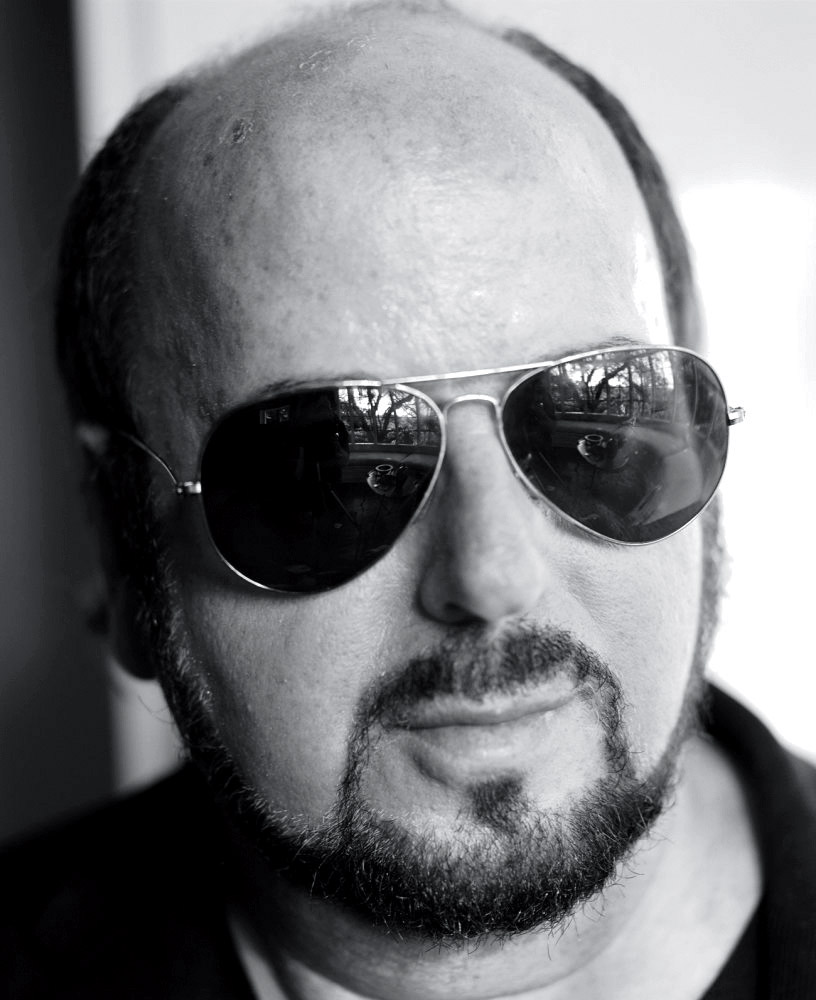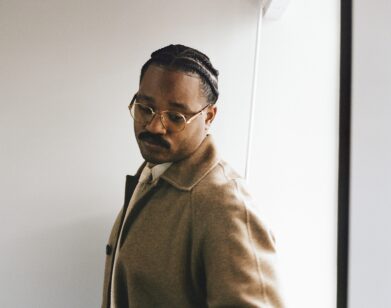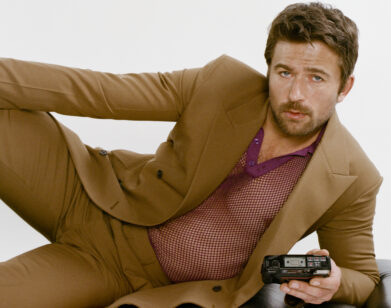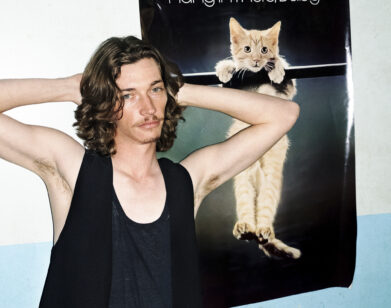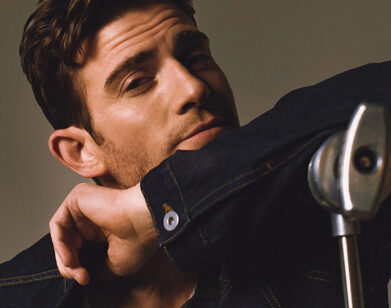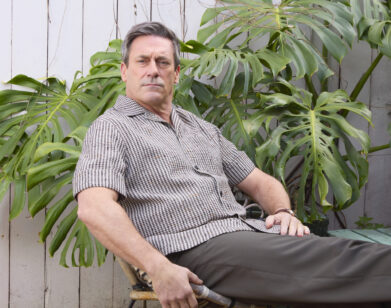James Toback
New York filmmaker James Toback has always had a kind of manic energy that mirrors his hometown of Manhattan. Since bursting onto the independent film scene in 1974 with his autobiographical script, The Gambler, followed in 1978 by his directorial debut, Fingers (remade in 2005 by Jacques Audiard as De Battre Mon Coeur S’est Arrêté), he has made films, written screenplays, won and gambled away fortunes, and obsessively pounded the streets of Manhattan, using them as both his inspiration and his office. Toback’s main obsessions-sex, drugs, and the odds-inform his movies. So it’s no surprise that his latest film, Tyson, a documentary on embattled former heavyweight-champion boxer Mike Tyson, is about all of those things. It is also about a man Toback can readily identify with, a man both tormented and exhilarated by who he is. Tyson, which will be released later this year, premiered to great acclaim at the 2008 Cannes Film Festival’s “Un Certain Regard” competition, where it was awarded the specially created “Knockout Prize.”
At 63, Toback shows no signs of slowing down. His tremendous energy would put most 30-year-olds to shame (and often does so on the sets of his movies). I became friends with Toback when I produced his film Black and White in 1998. We recently sat down for lunch at the Soho House in New York City. For four and a half hours.
HOOMAN MAJD: Jim, I’m going to record this.
JAMES TOBACK: [to waiter] What’s on the seafood platter? [phone rings] Excuse me, hello? Oh, hold on, I’ll be right with you. [to Majd] This is Tyson’s manager. [to waiter] I’ll have the shrimp, and a cheeseburger black and blue. What kind of cheese can you put on that? [back to phone] Hi. I’m doing an interview with Interview magazine right now. [hangs up] That was . . . Tyson has two managers, both of whom are very nice and good for him. Honestly, it’s a breath of fresh air after what he’s had since Cus D’Amato. [phone rings] Oh, it’s the lawyer. [to phone] Hi, Mark. I’m here with my friend Hooman doing an interview for Interview magazine, of which this conversation will be a part. Yes, just one second. [Toback leaves the table to carry on his conversation with Tyson’s lawyer. Returns to lunch being served.]
The way Tyson puts it in the movie is, ‘Insanity became my sanity.’James Toback
HM: Jim, what was the genesis of Tyson?
JT: Well, starting with when we did Black and White, it became clear to me that Tyson, whom I had known at that point for about 13 years—he had just come out of prison [following his 1992 conviction for the rape of former Miss Black Rhode Island, Desiree Washington] and was ripe to open up in interesting ways—was a terrifically cinematic figure. And he had this powerful effect on young, black, American males, whom I’d historically had an interest in. Many friends from the days when I was maybe six or seven were black, and, of course, in the Jim Brown era, I was immersed in the culture. [After graduating from Harvard in 1966, Toback wrote an “autobiographical memoir” of his time with football star Jim Brown.] The fascination that people had with Tyson only increased my sense of what might be interesting cinematically. And then Tyson was so good in Black and White—he improvised so well.
As Tyson said after seeing the movie, ‘It’s like a Greek tragedy. The only problem is I’m the subject.’James Toback
HM: We still don’t know if it was fake or not, Tyson physically attacking Robert Downey Jr. when we were shooting Black and White.
JT: It was probably both-the best acting always fools you into guessing. Tyson and I also had a lot of late-night conversations about things that haunted him in prison. He was in solitary confinement for a chunk of his three-year stint and mentioned right after he got out of prison that the description of my descent into madness under LSD had always obsessed him. He said that he understood, viscerally, what I meant by the loss of self, being overwhelmed by dread in the Heideggerian and Kierkegaardian sense. The way Tyson puts it in the movie is, “Insanity became my sanity.” That disorientation opened up a lot of fascinating questions. But getting back to the origins of the movie, what happened was, because of the Black and White performance, he and I started talking about doing a film. We’d have these long, late-night conversations about madness, dread, the void, and doing a film in which he really let out the linguistically fascinating complexity of his splintered mind. It would be a combination of an anecdotal history of one of the more intriguing lives of the 20th and 21st centuries, and, in addition, get into some of these very powerful psychological problems and sort of emblematic tragic developments. As Tyson said after seeing the movie for the first time, sitting there alone in the screening room in white sneakers, white pants, and a white T-shirt with his legs crossed yoga-style, “It’s like a Greek tragedy. The only problem is I’m the subject.” And so all of those things conspired to make it something I really wanted to do. And then the fact that my mother had just died . . . I’d been basically anchored in New York for three years, but I fled to L.A. after the funeral and decided that I had to start a movie immediately. It was the only way to avoid becoming overwhelmed by depression. And that meant financing the film myself because there is no such thing as “immediately” in movies that one writes. But with Tyson, the real task was going to be editorial. Because unlike a fictional narrative film, where even if you’re doing a lot of improvisation, you have the guideline of a script, I had only the vaguest notion of some structural imposition I could put on the chaos of the footage. I did ask Tyson questions with certain structural ideas in mind, but they were so . .HM: Your questions aren’t in the movie.
JT: No, they’re not. I decided to leave myself out altogether, physically and verbally.
HM: And there’s no narration.
JT: No. Tyson’s story is so compelling that I felt I would just let him carry on through. I think a lot of people have responded to the film because of its sort of raw, portraitlike nature.
HM: It is incredibly powerful, even if you despise the guy as some people do.
JT: I like testing a movie on strangers along the way to get a sense of how it is playing, but I decided to do something more specific with Tyson. I courted primarily women, but also guys who either didn’t like Tyson or didn’t like boxing or know much about it. I wanted people who went in with either an ignorant or a negative view. And I had a startlingly great response from everybody who fit into that category. People seemed to respond on the human level. In fact, the people who were into boxing were surprised because—
HM: The film is not about boxing.
JT: Right! They came in expecting to see, like, the HBO documentary about Joe Louis. But the movie is really a human portrait and one in which the subject makes no effort whatsoever to present himself in a light that will be flattering or exculpatory. I mean, Tyson knows that he comes with a history of internationally exposed behavior and that most people will go in with some kind of massive hard-on for him. He doesn’t in any way deny, excuse, or justify it. It’s essentially an explication of what he has done rather than an affirmation or a justification. If anything, he’s a bit rough on himself, like that line at the end of the movie where he says, “I know I have only myself to blame for all the problems I’ve had in my life.” The only time he loses it in terms of finding a culprit outside of himself is in his pained and angry description of Don King, who I think is probably the least surprising target of said anger.
HM: What’s interesting is that what Tyson is famous for-in the boxing world, at least-is his biting of Evander Holyfield’s ears during their heavyweight championship fight in 1997. In this movie, even though there are clips of that fight, his actions seem almost justified—which I had never imagined. You look at it in your movie and go, “Wait a second, he should’ve bitten his head off, not just his ear!”
JT: Absolutely. I did say to Tyson from the beginning that we’ve got to address the two things that you are, unfortunately, known for more than anything: the rape conviction and the ear biting. And the voice-over he does of the Holyfield fight is as dramatically compelling as the voice-over he would do of any other fight. He’s a real boxing historian, and he does a great commentary on all fights, but here he’s talking about himself biting Holyfield’s ear off. And again, it’s not an attempt to justify. It’s just an attempt to say, “This was what was in my mind, and this was what was happening that caused it.” And you see Holyfield choosing to take that huge, hard-and, one hesitates to say, steroid-enlarged- head . . . You think about that huge, hard head, and how it was used as a weapon to butt Tyson over and over again-in the first of their fights, as well. It looks like it was a conscious decision on Holyfield’s part to come in and butt him around the eyes. Tyson says, “I turned to the referee, and he did nothing,” and you see him look toward [referee] Mills Lane, who just ignores him, and you feel, “You should do something to Holyfield.”
HM: I was rooting for Tyson.
JT: He says, “I felt like killing everyone in his [Holyfield’s] corner!” Tyson extended the rage. And then—and it’s probably one of the most touching and haunting moments in the movie and a sociologically revealing one—Tyson says, “I went insane in the ring. I forgot about the Marquess of Queensberry rules. I didn’t care.” And you see him go totally berserk. After the fight is over, and Holyfield is declared the winner, and everybody is filing out, Mike Tyson is still trying to get at everybody-he still wants to get at Holyfield and kill him. People are trying to hold Tyson back. And then the sound fades, and Tyson says about that night: “I went home alone, and I sat there, and I drank some liquor and smoked some weed and fell asleep.” And you have this image of probably one of the three or four most famous people in the world doing something in the ring, which is probably the most famous negative act in the history of boxing, with hundreds of millions of people witnessing it, and three hours later he’s alone, drinking alcohol and smoking weed and falling asleep . . . The extreme movement from one place to the other in the same night is quite fascinating. I’ve had that sort of odd, almost perverse curiosity about these extremes with famous people over the years. Wilt Chamberlain, dead on his bed for days in Bel Air with no one knowing it, until his gardener happens to see him through the window. William Holden, one of the most famous actors in Hollywood, dead for four or five days in his apartment in Santa Monica, discovered because of the smell. These people who at one time probably couldn’t have had two seconds of privacy, being dead for days with no one being aware of it . . . And somehow Tyson being alone getting high after a hundred million people watched him . . .
HM: What do you think of the perception that people have of Tyson? I remember on Black and White, Julia Ormond refused to be in the movie.
JT: I approached Julia Ormond for the part that Brooke Shields eventually played. In fact, the name of the character was going to be Julia, because it was originally going to be Julia Ormond, just as Casey, played by Jared Leto, was originally for Casey Affleck. [pause] Gee, I wonder if I told those actors that.
HM: I don’t think you did.
JT: So I approached Julia Ormond about playing the part, and she was very excited and eager, and then when I mentioned that Mike Tyson was being added to the cast, she said, “Well, I’m afraid I can’t appear in the movie, if he’s in it.” And I almost thought she was kidding. Then I said, “You don’t even have any scenes with him.” And she said, “But that’s not the point. I don’t want to be in a movie that he’s in. I can’t justify that.” I think she fully expected me to say, “Well, of course I’ll get rid of Mike Tyson.” But I said, “Well, I’m sorry then. It’s just not going to work.” And there was this sort of odd moment on the phone, where she said, “So what are you saying? That you’d rather have Mike Tyson in the movie than me?” And I think I worded it more politely than yes.
HM: People are like that when it comes to Tyson.
JT: Oh, yeah. When dramatic events such as rape and ear-biting are attached to a person’s biography, they tend to overwhelm all of the other information. And, of course, with Mike, there are a lot of other factors, like the tattoos, the odd physical presence, the voice, and the massive brutality in the ring—and, I might add, tremendous speed, grace, and skill. When you look at the footage in the movie . . . Tyson has never said it, but it’s obvious that at his peak he was by far the greatest fighter that ever lived. He says that Muhammad Ali was, but I think that he could have destroyed Ali at his peak.
HM: You know, since Tyson—or maybe since Lennox Lewis—can anyone even name the heavyweight champion of the world? Unless you’re a real boxing fan.
JT: No, boxing died with Tyson.
HM: It kind of did, didn’t it?
JT: He refuses to admit it, but it did. When you look at a recent title fight, which was on HBO . . .
HM: I didn’t even know who was fighting.
JT: Wladimir Klitschko and Sultan Ibragimov. Ibragimov should have been in Klitschko’s corner as a cut man, not in the ring to fight, and Klitschko, unless someone is coming at him, is unbelievably boring. Nice guy, but you thought, “This is a heavyweight-championship fight?” I mean, boxing is not coming back. There’s not going to be a new Ali or a new Tyson. What’s happened to movies is happening to boxing-that is, too much availability of alternative, similar entertainment. Movies started to become diluted with the advent of television; that has been mirrored by the dilution of boxing, with kickboxing and absolute, extreme homicidal fighting. In a way, I think that the movie Fight Club [1999] did a weird, negative thing to boxing, culturally. I mean, it is sort of similar to what has happened to the novel. For however many good novels are written, the novel itself has completely lost its place. In fact, as Norman Mailer said in [Nicholas] Jarecki’s documentary about me [The Outsider, 2005], the novel is not now what it was when he was coming up, when the reference points were John Steinbeck and John Dos Passos and Ernest Hemingway. He said, “Now, you’d become a filmmaker.”
HM: Is that why you decided to become a filmmaker instead of a writer?
JT: Absolutely. I was determined to become a novelist on the order of Fyodor Dostoevsky. And around my second year at Harvard, I realized—
HM: That nobody reads Dostoevsky?
JT: No! That would have been okay. But Steve Saltonstall, who was in the writing seminar I was taking, was a much better writer than I was, so I thought that if in a class of 10 people, I’m second best, then the chances of my being the best novelist in the world are zero. And yet I tried. I started to write The Gambler as a novel. And then I realized I was seeing it as a movie, even though I’d never read a film script. And I started it over again. And then from working with [director] Karel Reisz on The Gambler and being there, as [Winston] Churchill put it, from erection to resurrection, I felt, “Oh, this is a great art because I can pull in music and visual imagery, and it has its literary aspects and drama.” Film was a sort of Wagnerian synthesis of the arts, as opposed to opera, which Wagner had thought would be. That’s another art form that has seen its best days.
HM: I take it then that you will not be directing an opera anytime soon?
JT: Ha! Right!
HM: To some people, it seems like it’s the twilight of civilization because we’re losing the so-called war of ideas and we’re losing the physical war as well. In your mind, is there an irony that these things could be happening at the same time?
JT: I think they’re interconnected. I think there’s a general sense that the belief structures that existed and carried civilization forward have weakened to the point where they can no longer support it. They are not powerful enough to do it anymore because there is not enough serious belief in them. And, in fact, I think that one of the things that is happening in the so-called “clash of civilizations” is that the confidence—and Tyson uses that word over and over again in the documentary-that was once obvious in the Western Judeo-Christian tradition has been weakened tremendously. There’s a feeling that there’s a cynical, corporate layer that’s really driving it—one that’s ready to compromise-and that the real confident energy around the world is coming from Islam, that the believers take their own faith at face value and with great confidence and in far greater numbers.
HM: So I’ve been meaning to ask you: What do you think about the fact that the offtrack betting outlets might be closing?
JT: My feeling about all gambling venues-OTB foremost among them-is that I’d be happy if they were shut down permanently. I look at all these gambling establishments as conscious traps meant to ensnare middlebrow, nonprofessional, nonaddictive gamblers who are just going to lose a certain amount that they’ve budgeted. And worse, for people like me who are not casual gamblers but have a serious addictive nature, the attitude is, “We’ll take every penny you have. And, if you leave any money at home, feel free to get it and come back, and we’ll take that, too.”
HM: You had an entire chapter devoted to you in Art Manteris’s book SuperBookie.
JT: Yes. That was in the early ’80s. I was on a binge.
HM: You were also on a roll!
JT: Oh, I was unstoppable! I think it was in 1981-I had the best run in the history of Las Vegas, betting on baseball. I knew which pitchers were going to do well and against what teams, and I did almost nothing but win for that baseball season. And that, of course, is the problem with addictive personalities, because a year later I had none of it left. So there is no amount of money that is enough to win. Some people were saying to me at the time, “How could you have lost all that?” And I’d always say, “What you don’t understand is that the real question is ‘How did you win so much?’ because you would have stopped a fifth of the way up! You would have said, ‘I have enough!'” But it’s the same thing in one’s personality that says, “There is no such thing as enough,” that also says, “I’ll keep going until I have nothing left.” The problem is that the second voice is unconscious. You don’t realize that you’re actually waiting to get cleaned out. The most frightening truth that a compulsive gambler has is, “I am going to continue to gamble until I have nothing left or until I am stopped.” If you shut down all the gambling venues, that would be a good way of stopping.
HM: There is always going to be a bookie who will take your action.
JT: So then you have to face up to a painful reality, which is that you can’t do it at all. In the same way that I can’t smoke and I can’t drink, I can only not do those things if I’m clean and extreme.
HM: But you’re like that—extreme.
JT: Always have been. As Tyson says in the documentary, “No one who isn’t an extremist can understand the mind of an extremist.” Which I believe is true, because otherwise it just seems insane. You get very rational and say, “Why are you smoking four packs of cigarettes a day? Can’t you just smoke two cigarettes?” And I say, “No, I can’t.” “But four packs is going to kill you!” “I know.” “Well, do you want to die?” And the more rational you get, the more ignorant you are of what’s really going on because it’s not a rational process. You wouldn’t be doing it in the first place if it were rational. During my first few movies, I was drinking. I did Fingers when I was drinking all the time. It didn’t hurt that movie—I was just killing my liver. The production report on Exposed [1983] said that the director chain-guzzled Dom Pérignon throughout the shoot. You know, the only thing that stopped my being a drug addict was flipping out on LSD. Had I not done that, I would’ve been dead from drugs in a year-or less-because I could not have gone more than a five- or 10-minute stretch without getting high back then. I had reached the point where I was an editor at the Harvard Advocate, the literary magazine, and I was choosing people to be on the staff based on whether or not they got high. I believe that I intentionally went insane on LSD so I could escape my addictions.
HM: So what is the next movie, Jim?
JT: It’s a movie called The Director, which I’m getting increasingly excited about. It deals with a lot of the themes I’ve dealt with in the past, but, if it works, out, it’ll be one of the first movies to give a really good sense of what a writer-director goes through in creating a movie. I mean there have obviously been some movies made about that process—Federico Fellini’s 8½ [1963] is the most obvious example. But I’ve had such a particular—and at the same time representative—history now of making movies for more than 30 years, and a lot of things have happened, so I think I’ve come up with a great way of getting a story out of it. There is some pretty surprising and radical stuff. [Toback unfurls a napkin with a huge quantity of multicolored pills inside.]
HM: Wow. That’s a quite a buffet.
JT: I take 125 vitamins a day.
HM: But these pills are different colors and different shapes. In the morning, do you have to sit there and count them all out?
JT: Oh, yeah. Absolutely! I spend a half-an-hour every morning arranging them and wrapping them up.
HM: Which goes back to your obsessive personality.
JT: Absolutely.
Hooman Majd is a new york City-based writer. His book The AyaTollah Begs to differ will be published by Doubleday in the fall.

